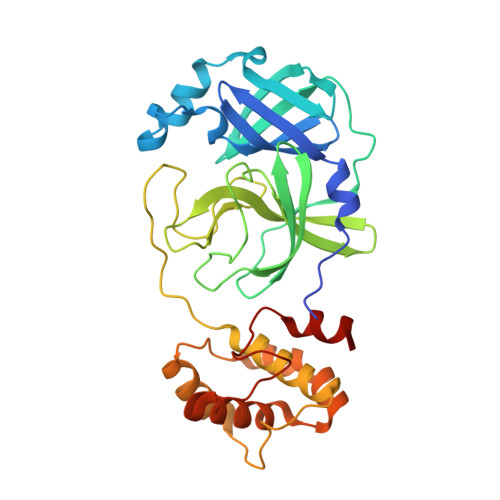Postinfection treatment with a protease inhibitor increases survival of mice with a fatal SARS-CoV-2 infection.
Dampalla, C.S., Zheng, J., Perera, K.D., Wong, L.R., Meyerholz, D.K., Nguyen, H.N., Kashipathy, M.M., Battaile, K.P., Lovell, S., Kim, Y., Perlman, S., Groutas, W.C., Chang, K.O.(2021) Proc Natl Acad Sci U S A 118
- PubMed: 34210738
- DOI: https://doi.org/10.1073/pnas.2101555118
- Primary Citation of Related Structures:
7K0E, 7K0F, 7K0G, 7K0H - PubMed Abstract:
Severe acute respiratory syndrome coronavirus 2 (SARS-CoV-2) infection continues to be a serious global public health threat. The 3C-like protease (3CLpro) is a virus protease encoded by SARS-CoV-2, which is essential for virus replication. We have previously reported a series of small-molecule 3CLpro inhibitors effective for inhibiting replication of human coronaviruses including SARS-CoV-2 in cell culture and in animal models. Here we generated a series of deuterated variants of a 3CLpro inhibitor, GC376, and evaluated the antiviral effect against SARS-CoV-2. The deuterated GC376 displayed potent inhibitory activity against SARS-CoV-2 in the enzyme- and the cell-based assays. The K18-hACE2 mice develop mild to lethal infection commensurate with SARS-CoV-2 challenge doses and were proposed as a model for efficacy testing of antiviral agents. We treated lethally infected mice with a deuterated derivative of GC376. Treatment of K18-hACE2 mice at 24 h postinfection with a derivative (compound 2) resulted in increased survival of mice compared to vehicle-treated mice. Lung virus titers were decreased, and histopathological changes were ameliorated in compound 2-treated mice compared to vehicle-treated mice. Structural investigation using high-resolution crystallography illuminated binding interactions of 3CLpro of SARS-CoV-2 and SARS-CoV with deuterated variants of GC376. Taken together, deuterated GC376 variants have excellent potential as antiviral agents against SARS-CoV-2.
Organizational Affiliation:
Department of Chemistry, Wichita State University, Wichita, KS 67260.
















